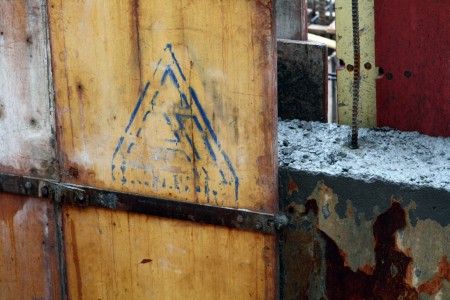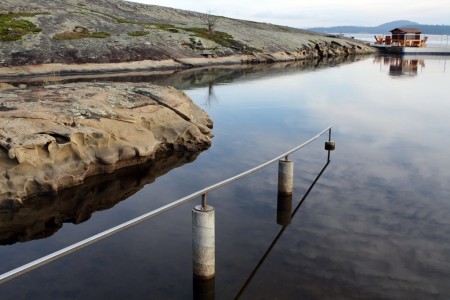
Having already read a great deal about climate change and the Arctic, I expected Alun Anderson’s After the Ice: Life, Death, and Geopolitics in the New Arctic to provide only a moderate quantity of new information. I was quite surprised by just how much novel, relevant, and important content he was able to fit into the 263 pages. The book discusses the historical and current relations between governments and Arctic indigenous peoples; ice flow dynamics and exploration; the changing nature of Arctic ecosystems and species, along with information on what climate change may do to them; international law and the geopolitical implications of a melting Arctic; oil, gas, and other natural resources, and how their availability is likely and unlikely to change in coming decades; the rising tide of Arctic shipping, and the special safety and environmental considerations that accompany it; and the feedback effects that exist between a changing Arctic and a changing climate.
Ecosystems
Some of the best information on the book is about biology and Arctic ecosystems. It describes them from the level of microscopic photosynthetic organisms up to the level of the megafauna that gets so much attention. Anderson argues that most of the large marine mammals (seals, walruses, whales, etc) are threatened to some extent or another by the loss of sea ice. This is for several reasons. First, it could disrupt the lowest levels of the food web they rely upon. Second, it could permit the influx of invasive species that could out-compete, starve, or attack existing Arctic species. Third, the lifecycles of Arctic animals are slow and deliberate, and thus liable to disruption from faster-breeding competitors. Disappearing sea ice off Svalbard has already completely wiped out what was once “one of the best areas for ringed seal reproduction.” Arctic species, argues Anderson, will need to “move, adapt, or die.” Generalists like beluga whales have promise, while the narwhal and polar bear may be the most vulnerable large creature in the ecosystem.
One consequence of the loss of multi-year sea ice that I had not anticipated is the potential for a massive migration of species between the Pacific and Atlantic oceans, with invasive species potentially seriously altering the composition of ecosystems on both sides. Melting ice could therefore produce major changes in much of the world’s ocean. Even before that, expanded range for orcas could have a significant effect on life in northern waters. Where ice used to provide safety, by obstructing their pectoral fins, these powerful predators increasingly have free reign.
Resources, shipping, and tourism
Anderson makes an effective argument that most of the oil, gas, and resources in the Arctic will be effectively locked away for some time yet. There will always be ice in the winters, glacial ice calving off Greenland and other Arctic islands poses a significant risk due to its extreme hardness, and very high commodity prices are necessary to justify the risk and capital investment required to operate in the region. (See this post on the the Shtokman gas field.) He expects that, even if there is a boom, it will be short-lived and of limited benefit to those living in the region. In particular, he cautions people living in the north not to abandon traditional ways of life sustained by things other than oil and gas. Living for a couple of rich decades and then being left with nothing would be a tragic outcome.
The book also downplays fears about a scramble for resources and sovereign control. Anderson argues that the United Nations Convention on the Law of the Sea (UNCLOS) already provides a clear legal framework and that negotiated outcomes are probable. That should provide some comfort to those concerned about diplomatic or even armed conflicts in the changing north. One danger Anderson does highlight is how the risk of collision with ice, increasing shipping and tourist traffic, and the absence of emergency response capabilities could combine. He describes plausible scenarios where major oil spills or massive loss of life could result, due to a problem with a tanker or a cruise ship (disproportionately full of elderly people susceptible to cold, as they are).
While Anderson does an excellent job of explaining some of the risks to species and human beings from a changing Arctic, he doesn’t take seriously the possibility of truly radical or catastrophic change, of the kind highlighted as possible by James Hansen. Anderson also completely fails to describe how the incremental emissions from burning oil and gas in the Arctic would inevitably increase the degree of climate change experienced by humans and natural systems. It is cumulative emissions that matter most, and extracting hydrocarbons from the far north can only increase those.
For anyone with an interest in what is happening to the Arctic and what the medium- and long-term implications of that might be, this book is enthusiastically recommended.







